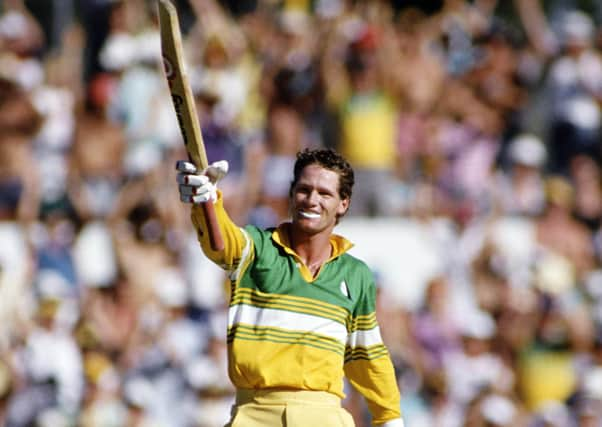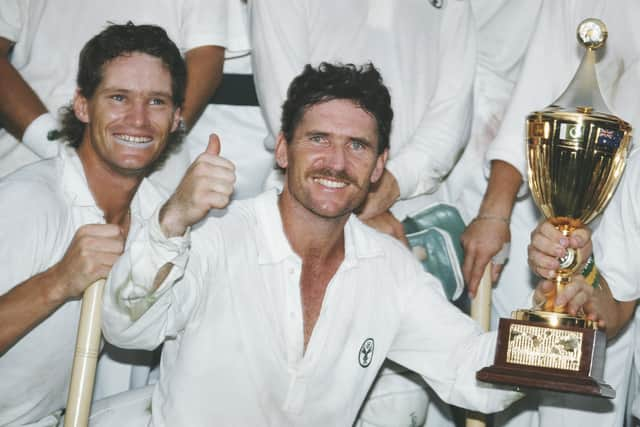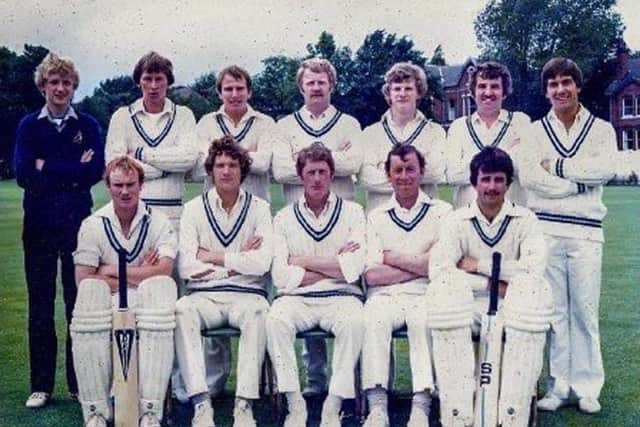When Dean Jones’s path to cricketing glory began in the snow at Altofts


The visitor, on his first trip outside his Victorian homeland was Dean Jones, who went on to be a supremely talented batsman for his country – particularly in the one-day format – before becoming a highly respected TV commentator.
Jones’s sudden death at 59 while on commentary duties in India last month, robbed cricket of one of its leading lights and Jackson, now 81, of a man who went on to become a close friend.
Advertisement
Hide AdAdvertisement
Hide Ad“Deano,” as Jackson knew him, “was due into Wakefield Westgate but when I went to meet him he wasn’t there.


“I looked around and waited about half an hour then went home and got another call from him saying he was at Kirkgate, the train had been diverted there from Westgate due to the bad weather.
“I got there and saw a shivering young boy with hardly any clothes on straight out of Victoria for the first time in his life, with the ground two feet deep in snow wondering how we were going to play cricket.
“I told him not to worry as the snow would clear and we’d be able to play.
Advertisement
Hide AdAdvertisement
Hide Ad“So that was a real introduction. I got him some accomodation at my grandma’s old house in Altofts, with three New Zealanders we had already signed. It was a great experience for them and they became lifelong friends.”


Altofts stalwart Jackson admits he “knew nothing” about Jones prior to signing him but was tipped off by Gary Miles, an Australian who had played for the Lock Lane side the previous summer.
“He had played in Melbourne for a district team called Carlton and said he knew someone in the seconds who wanted to come over so I said no problem.
“I did not do any research on him, I just said fine. I later found out Deano had been the most prolific player in Victoria junior cricket scoring double hundreds as a 12/13-year-old boy.
Advertisement
Hide AdAdvertisement
Hide Ad“He was recovering from glandular fever so it was touch or go whether he came, but he never missed a game for us.”
With the three Kiwis – Lindsay Crocker, Alan Hunt and Ronnie Hart, plus Jones in the starting XI, it is perhaps not surprising the Lock Lane outfit won the Central Yorkshire League Premier Division title and then the Yorkshire Council play-offs for the first time in its history.
Crocker, Hart and Hunt all went on to play first-class cricket in their homeland while the irrepressible Jones reached the very top of the tree – testament to the quartet’s willingness to work hard and learn according to Jackson.
But the future Australian Test star did not always get things all his own way as Jackson revealed: “We didn’t bat Dean before No 5 and he was not happy about that but he opened the bowling every game. I played every game with Deano and was very close to him all the time. He was 20, I was 40 and playing through the games, talking, coaching and mentoring him.
Advertisement
Hide AdAdvertisement
Hide Ad“I used to open the batting but I sacrificed my spot for the guys and ended up at eight or nine –so I didn’t see much action that season!
“Quite honestly, I knew he was a good player but to say he was going to be a legendary player for Australia would have been difficult at the time.”
In the end, after a slow start, Jones scored over 700 runs and took around 40 wickets for the Altofts club after his fortunes changed following a mid-season innings at the old Hunslet Nelson ground in Leeds.
Jackson said: “His first innings of note was at Hunslet Nelson. We played there and our two opening batsmen were really slow. He got in and scored his first 50, and hit one six out of the ground and I have never forgotten that.”
Advertisement
Hide AdAdvertisement
Hide AdJones’s time in the area also drew the Victorian into contact with one of the Wakefield area’s all-time great players, Yorkshire and England batsman Geoffrey Boycott.
Jackson explained: “I introduced him to Geoff. He used to have Deano bowling for him at Ackworth and then he’d pick him up and take him to Headingley. He used to use Deano as his bowling partner in the nets there.
“I just think all the experiences Deano got in England helped him as a player and he told me it was his experiences at Altofts that spurred him on.”
One team Jones never played for, much to the disappointment of both Jackson and the player himself, was Yorkshire.
Advertisement
Hide AdAdvertisement
Hide Ad“One of my biggest regrets is that he never played for Yorkshire. I tried and tried desperately for them to sign him and he really wanted to play for them, but it never happened.”
Less than three years after leaving Altofts, Jones’s heady rise was crowned with his first Test cap for Australia against West Indies on March 16, 1984.
He went on to wear the Baggy Green 52 times over a 10-year period, scoring 3,631 runs, but perhaps his most famous five-day innings came in just his third Test against India, a knock Jackson says “almost killed him”.
Batting with pugnacious captain Allan Border, Jones was severely dehydrated in the Chennai heat and was sick on the field.
Advertisement
Hide AdAdvertisement
Hide AdJones wanted to retire ill but Border warned him: “At 170 I said ‘if you can’t keep going I’ll get a Queenslander on’,” referring to Greg Ritchie, next in and a native of the state, like his captain.
Jones batted on and scored 210 – still the highest score by an Australian in India, to help earn his side a famous tie and then spent the night on a drip.
The right-hander played 164 ODIs, scoring 6,068 runs with Border saying he “revolutionised the game”.
Jones returned to Yorkshire in 1986 to play for Nostell CC in the Leeds League and lived above a fish shop in Normanton.
Advertisement
Hide AdAdvertisement
Hide AdFellow Victorian Tony Dodemaide played for Nostell at the same time and was later capped, with Jones unsurprisingly scoring over 1,500 runs that season.
Despite his rise to global stardom, Jones never forgot his time at Altofts.
He was due to return there next year as part of a 40-year reunion for the famous 1981 side, having agreed to do a sporting dinner for the club, and on previous visits he put on coaching master-classes for the club’s youngsters.
“Just imagine, all those young boys and sat among them giving them tips and advice, a true Test star,” said Jackson.
Advertisement
Hide AdAdvertisement
Hide Ad“He was a very good friend. I spent about 30 winters in Melbourne so I worked on the sports camps coaching with him.
“He was misunderstood in a lot of quarters. A lot of people thought he was brash but I always got on pretty well with Deano. His death is a real big shock.”
There was a huge outpouring of grief from players and fans across the globe following his death and Jones’s funeral took place at the MCG last Wednesday, a place Jackson saw him bat many times.
He said: “He became my favourite batsman of all time, having helped and mentored him. He was the best one-day batsman in the world for a while.
“The white Viv Richards, that’s what I used to call him.”
Support The Yorkshire Post and become a subscriber today.
Advertisement
Hide AdAdvertisement
Hide AdYour subscription will help us to continue to bring quality news to the people of Yorkshire. In return, you’ll see fewer ads on site, get free access to our app and receive exclusive members-only offers.
So, please - if you can - pay for our work. Just £5 per month is the starting point. If you think that which we are trying to achieve is worth more, you can pay us what you think we are worth. By doing so, you will be investing in something that is becoming increasingly rare. Independent journalism that cares less about right and left and more about right and wrong. Journalism you can trust.
Thank you
James Mitchinson